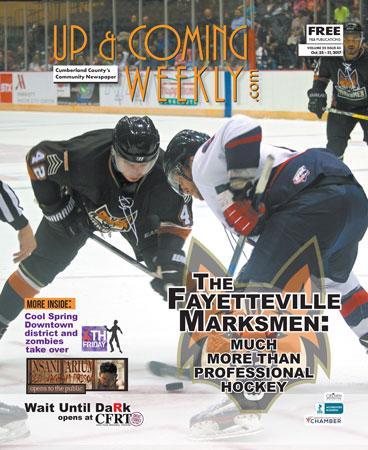 This weekend, the newly-named Fayetteville Marksmen will drop their puck on home ice for the first time. Friday, Oct. 27, the Marksmen take on Huntsville Havoc at the Crown Coliseum from 7-10 p.m. Spectators should expect more than a new name from the team; the first home game of the season will demonstrate a new atmosphere and a shift in focus, too.
This weekend, the newly-named Fayetteville Marksmen will drop their puck on home ice for the first time. Friday, Oct. 27, the Marksmen take on Huntsville Havoc at the Crown Coliseum from 7-10 p.m. Spectators should expect more than a new name from the team; the first home game of the season will demonstrate a new atmosphere and a shift in focus, too.
The Marksmen will measure success in terms of community engagement and the consistent creation of a quality experience for spectators, according to co-owners Chuck Norris and Jeff Longo.
“The results of the team that we put on the ice are very important, but they’re not nearly as important as the overall success of the organization in being a community asset,” Norris said. He added that as a re-branded organization, the Marksmen want to be very involved “in the local scene; be at different events, have our players in schools.”
“We’re more than a professional hockey team,” Longo said. “We know there’s a fairly finite number of hardcore hockey fans in Fayetteville, and we want to appeal to people who might not know as much about hockey but who are looking for a very fun yet affordable evening.”
Norris and Longo hit the ground running when they took over management of the previouslynamed FireAntz in mid-March. Norris, an Army veteran now located in Charlotte, who lived and did business in Fayetteville for 20 years, serves as CEO. Longo, who spent over 20 years in professional hockey in upper management positions, serves as president.
Their plan to position the team as a community asset rather than simply as a sports team involves working with over 70 local partners and sponsors, including the Cumberland County Commissioners, the Cumberland County Crown Commission, the Salvation Army, Special Olympics North Carolina, Fort Bragg MWR, United Service Organizations of Fort Bragg, Cape Fear Youth Hockey, Fayetteville Kiwanis Club and Project Healing Waters Fly Fishing.
These partnerships and the overall goal of quality entertainment will be reflected at home games throughout the season, which runs through April 2018. “We got really lucky this year; our schedule features 24 Fridays and Saturdays,” Longo said. He explained that 14 of the team’s 20 home games this season will feature extras in terms of entertainment, with seven of those 14 having big themes and being the most elaborately planned.
Kicking off these “big seven” is the first home game of the season on Oct. 27. Appropriately themed Opening Night, the evening will feature food trucks in the parking lot prior to the game and a Marksmen flag giveaway for the first 2,000 spectators to enter the building. Those who purchase special ticket packages will receive a free flag as well. Fans will also receive a voucher from Bubba’s 33 for a buy-one, get-one-free pizza when they purchase tickets. The other biggest games of the season are:
Friday, Nov. 25: Teddy Bear Toss – After the first goal of the game is scored, fans rain teddy bears they brought from home down onto the ice. Players later give the bears to children at Cape Fear Hospital. There will also be a puck giveaway and $1 hotdogs.
Friday, Dec. 22: Star Wars Jerseys – After the game, at center ice, Star Wars jerseys that have been worn and autographed by players will be up for live auction. A portion of the proceeds will directly benefit the Salvation Army. Beer will be available for $2.
Saturday, Jan. 20: Pooch Party – Bring your dog to the game. Marksmen military-style cap giveaway and $1 hotdogs.
Saturday, Feb. 10: Pink in the Rink – The team will partner with Highland OB/GYN of Fayetteville to raise breast cancer awareness. Pink T-shirt giveaway and $1 hotdogs.
Saturday, March 10: Nickelodeon Night – Look out for your favorite Nickelodeon characters! Youth jersey giveaway and $1 popcorn.
Friday, March 30: Fan Appreciation night. Last game of the regular season.
Longo said he hopes many of these themed nights, including the Teddy Bear Toss and the Pooch Party, will become annual traditions. But games not falling within these dates will still have fun incentives and extras of their own.
For the second game of the season – Saturday, Oct. 28 – a ticket package includes four tickets, four pucks and a $50 gift certificate to Carrabba’s for $49.
Boy scout nights are Oct. 27, Jan. 13 and March 10. Scouts will have the opportunity to camp out at the Crown following the game on Jan. 13. Nov. 4 is the first of many military nights, when service members will get the best seats in the house for only $10.
 At the time of this article’s publication, Marksmen first-time head coach Nick Mazzolini and director of hockey operations Ryan Cruthers will have just finished finalizing the Marksmen’s 2017-18 roster. Mazzolini recently retired from a successful career in professional hockey. His first season as a professional player was with the Alaska Aces of the East Coast Hockey League; he served as captain for the 2013-14 season, during which time the Aces won the Kelly Cup. He’s also played for Italy’s top hockey league, Hockey Club Bolzano, and Germany’s second-tier professional hockey league, Del2.
At the time of this article’s publication, Marksmen first-time head coach Nick Mazzolini and director of hockey operations Ryan Cruthers will have just finished finalizing the Marksmen’s 2017-18 roster. Mazzolini recently retired from a successful career in professional hockey. His first season as a professional player was with the Alaska Aces of the East Coast Hockey League; he served as captain for the 2013-14 season, during which time the Aces won the Kelly Cup. He’s also played for Italy’s top hockey league, Hockey Club Bolzano, and Germany’s second-tier professional hockey league, Del2.
Longo shared his excitement about Mazzolini: “As soon as Nick’s name became available, (Cruthers) said, ‘We’ve got our guy.’ … Nick was asking us so many questions about the community and wanting to get just as involved as we did.”
Since the Marksmen is a developmental league, the team experiences a high turnover rate – about 40 percent of players returned each season while they were the FireAntz, and that trend will probably continue, according to Longo.
That’s why the new name and team mascot were chosen so carefully, Norris and Longo said. They want fans to connect with a team name – the Marksmen – that honors Fort Bragg’s elite, and a mascot – the Carolina red fox – that “can be vicious and ferocious … and also the big cuddly mascot that children want to hug.”
The Marksmen are working from a good foundation. The FireAntz helped found the Southern Professional Hockey League in 2004 and hosted eight of the nine largest crowds in SPHL history.
“The support is there; the community wants the product,” Longo said. “We just needed a little punch in the arm and a new approach. Chuck’s got a great vision for what success looks like, and we’ve tripled the size of our staff so we can execute everything we’re talking about.”
Jim Grafstrom, general manager of the Crown Complex, couldn’t be more excited about the future of the team. “The new ownership tandem of Chuck Norris and Jeff Longo are a dynamic group that are looking to not simply re-brand the team, but re-brand the experience,” he said. “The Marksmen organization has made a concentrated effort to transform the standard hockey event into a memorable fan experience that the whole family will enjoy. … It’s not just about the game, it’s about the fan experience.”
Purchase tickets and learn more about the team at www.marksmenhockey.com.
 How to resolve AdBlock issue?
How to resolve AdBlock issue?  How to resolve AdBlock issue?
How to resolve AdBlock issue?  How to resolve AdBlock issue?
How to resolve AdBlock issue?  How to resolve AdBlock issue?
How to resolve AdBlock issue?  How to resolve AdBlock issue?
How to resolve AdBlock issue?  How to resolve AdBlock issue?
How to resolve AdBlock issue? 





